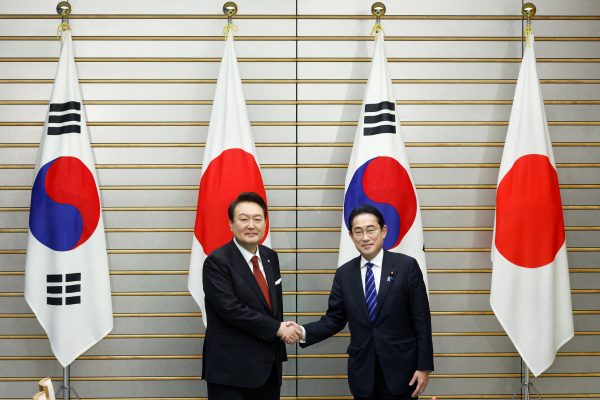Although the government of Japan and Japanese companies are not required to contribute to the fund, the Yoon government expects that positive steps from Japanese Prime Minister Fumio Kishida’s government will follow. The 1965 treaty, the 2015 Comfort Women Agreement and the many economic and security agreements signed over the past 58 years demonstrate that the governments regularly ‘move past’ history to meet state-centric objectives. But the benefits of the 2023 force labourer agreement will be fleeting if it replicates the fatal flaws of past reconciliation efforts.
In 1997, several South Korean victims of forced labour filed lawsuits in a district court in Japan against the Nippon Steel Corporation. The case was dismissed twice, in 2001 and 2002, on two counts. The first was that Old Nippon Steel had exploited the labourers but New Nippon Steel was a different legal entity. The second was that compensation for colonial grievances had been settled in the 1965 Claims Agreement.
In a groundbreaking ruling in 2012, the South Korean Supreme Court remanded the case, stating that the Japanese ruling denied the illegality of Japanese colonial occupation, which is inconsistent with the Constitution of the Republic of Korea. In 2018, the case was sent to a lower court, which then ruled in favour of the plaintiffs and ordered that New Nippon Steel pay the victims 100 million won (US$87,000) each in reparations. New Nippon Steel appealed the case, but the South Korean Supreme Court upheld the lower court’s ruling.
The Japanese government warned ‘serious ramifications’ if the rulings were enforced and in 2019 imposed controlson the export of chemicals used in semiconductor production to South Korea. Both countries removed each other from their whitelists of preferred trading partners, causing a rift in relations until 2023.
A critical weakness of the 2015 Comfort Women Agreement, which included direct payments from the Japanese government and a renewed apology, was that it did not receive the blessing of victims, several of whom argue it did not reflect their views and demands. Heartbroken comfort women berating Lim Sung-nam, the former South Korean vice foreign minister took over the headlines and large protests took over the streets. Several forced labourers have begun protesting the 2023 deal because they are not receiving funds or an apology directly from Japan.
The Japan Business Federation and the Federation of Korean Industries have announced that they will contribute 100 million yen (US$747,420) each to a ‘future partnership fund’ supporting youth-focused programming. The Japanese government will not contribute to a fund and reiterated that it would inherit previous apologies without issuing a new one.
Defenders of the plan may point to the 2015 Agreement collapsing despite reparations and a renewed apology provided by the Japanese government as evidence that the current demands are not in good faith. But the 2015 Agreement fell through because victims felt they were not adequately consulted and the terms avoided engaging with history by settling the issue finally and irreversibly. Deals must be assessed in their totality.
Of the original 15 plaintiffs in the 2018 Seoul court case, 10 of their families will accept compensation, while two families of deceased plaintiffs have rejected the government proposal. The surviving plaintiffs who reject the 2023 plan may not find any closure by the time the funds are dispersed. The 2015 Agreement was a failure because neither Japan nor South Korea received what they had hoped for. Japan could not secure the removal of a comfort woman statue in front of the embassy of Japan in Seoul nor the end of criticisms of the comfort women issue.
It is unclear which companies will contribute to the 2023 fund or how much and how soon. All the tangible gains have been between the governments of Japan and South Korea, primarily on economic and security issues. Currently, business federations have only pledged US$1.5 million. Many analysts believe the deal is likely to fall through without domestic approval. The 2023 forced labourers plan is highly unpopular among the Korean public, opposition lawmakers and the three surviving plaintiffs of the 2018 court case, who consider the agreement ‘humiliating’ and an ‘absolute win by Japan’.
Issues beyond the scope of the 2023 proposal — such as the seafood ban, island disputes, Sea of Japan naming disputes and textbook protests — will be potential roadblocks to bilateral cooperation going forward. At best, one of many issues historical issues is being tackled, but conflict over Japan’s colonial legacy and all the animosity that stems from it is far from settled.
Alliance watchers are understandably frustrated when historical disputes get in the way of a united front against North Korea and better management of China. Yet, they may place too much faith in the Japanese private sector to solve the history issue when the heart of the conflict is distrust between the South Korean public and the Japanese and South Korean governments due to decades of failed reconciliation.
Tom Le is an Associate Professor of Politics at Pomona College and the author of Japan’s Aging Peace: Pacifism and Militarism in the Twenty-First Century.
Hanah Park is an international relations student at Pomona College.
Hina Tanabe is an economics student at Pomona College.

